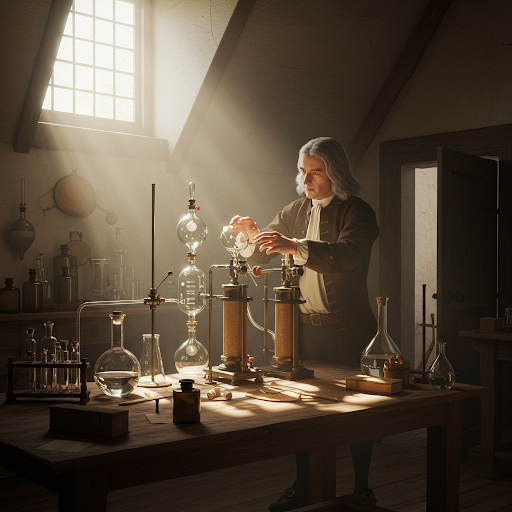The Sceptical Chymist: Unlocking the Secrets of Air and Matter.
1660, Oxford. A dimly lit laboratory, where the secrets of the natural world are revealed through careful observation and experimentation. The air crackles with static electricity, and the hum of machinery fills the room.
Boyle, his face illuminated by the flickering light of a candle, carefully adjusts the valves on his air pump. “Observe,” he declares, his voice a low murmur, “the pressure of the air, its weight, its very essence.” He points to a glass flask connected to the pump, its contents swirling and changing. “The air,” he explains, “is not a mere void, but a substance with its own properties.”
You notice a series of notebooks filled with intricate diagrams and observations, and a manuscript titled “The Sceptical Chymist,” its pages filled with challenging the traditional alchemical theories. A faint, rhythmic hissing emanates from the air pump, and you hear Boyle whisper, “Experimentation, not dogma, is the key to unlocking the secrets of nature.” A fragment of papyrus lies near the pump, bearing the inscription: “Question everything, doubt everything, and seek the truth through rigorous experimentation.”

The air is not a void, but a substance with measurable properties.
The air pump begins to hiss and groan, drawing a vacuum within the glass flask: “Explore the properties of air and discover the secrets of its behavior.” A collection of chemicals and scientific instruments beckons: “Conduct your own experiments and unravel the mysteries of matter.
A hidden door leads to a chamber filled with ancient texts and alchemical symbols: “Challenge the old dogmas and forge a new path for scientific inquiry.” Boyle’s meticulous experimentation and emphasis on empirical evidence, while groundbreaking, were also influenced by the philosophical framework laid by Francis Bacon. Bacon’s advocacy for inductive reasoning and a systematic approach to scientific inquiry provided a foundation upon which Boyle and subsequent scientists built their understanding of the natural world.
